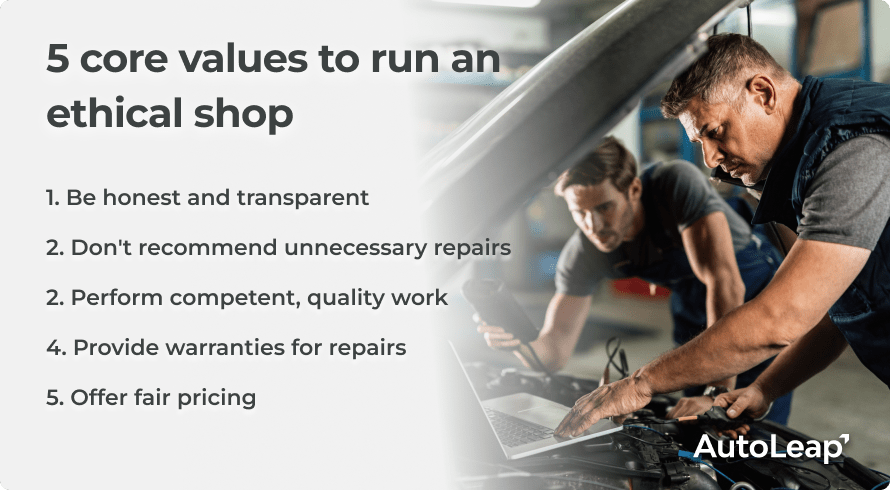Earning customer trust is essential for your auto repair business. And ethical pricing is a very important part of that process.
In this blog post, we will cover every ethical pricing strategy for your auto repair shop. Let’s get started!
Ethical pricing strategies to make your auto repair shop thrive
Implement ethical pricing strategies to establish a positive reputation and foster your long-term customer relationships.
Some ethical pricing strategies to consider include:

- Provide transparent pricing: Display your prices for shop services online and at your physical location. This transparency helps customers understand what charges will apply for specific services, reducing the likelihood of surprises.
- Give detailed estimates: Provide detailed estimates for repairs and services. You can use estimating software for auto repair shops to help speed up estimates creation. Explain the breakdown of costs, including parts, labor, and additional fees. If there are multiple options for parts or repairs, explain the differences and associated costs.
- Offer honest recommendations: Only recommend necessary services for the vehicle’s safety and functionality. Avoid pushing unnecessary repairs or services. Building a reputation for honesty and integrity will earn your customers’ trust.
- Cater to different budgets: Offer options that cater to different budget levels. This could include providing alternatives for OEM and aftermarket parts.
- Itemize your invoices: Provide itemized invoices that detail the specific parts, labor hours, and associated costs for each service with help of invoicing tool. This reinforces transparency and demonstrates that you charge for the actual work performed.
- Display customer reviews: Display customer reviews and testimonials on your website and at your shop. Positive feedback from previous customers can reassure new customers about the quality of your services and ethical practices.
- Consider competitive price matching: Consider offering price matching for identical services that competitors offer. Additionally, provide guarantees for the quality of your work to give customers peace of mind.
- Lead by example: Demonstrate ethical leadership within your shop. Your behavior and commitment to ethical pricing will set the tone for your employees and shape the shop’s culture.
But that’s not all. To help your auto repair shop thrive, you can implement ethical strategic pricing models that work best for you!
Ethical pricing models to consider
- Flat-rate pricing: In this model, common repairs are assigned a fixed price based on industry standards. This provides transparency and ensures customers are charged the same price for the same service, regardless of the time it takes to complete.
- Menu pricing: Create a menu of common services with fixed prices for each. Customers can see upfront what each service costs, promoting transparency and helping them make informed decisions.
- Subscription maintenance plans: Offer customers a subscribe option to regular maintenance plans. Customers pay a monthly fee for scheduled maintenance services, promoting preventative care and reducing the need for major repairs.
- Hourly labor rate: Charge customers based on the technician’s time spent on repairs. Ethical implementation involves accurately tracking labor hours and communicating the hourly rate upfront.
- Tiered pricing: Offer different levels of service, each with varying prices. For example, a basic oil change may come at a lower price than an oil change that includes additional inspections and maintenance checks.
- Value-based pricing: Offer premium service packages that provide extra value, such as longer warranties or expedited service. Ethical use involves communicating the additional benefits customers receive and justifying the higher price.
- Ethical upselling packages: Create packages that bundle essential services at a discounted rate. Clearly explain the value of each package and allow customers to choose based on their needs.
- Warranty pricing: Offer extended warranty on parts or labor for an additional fee. Ethical practice involves explaining the terms of the warranty and its associated costs.
- Diagnostic fee with credit: Charge a diagnostic fee upfront for identifying the issue. If the customer agrees to proceed with the repair, the diagnostic fee applies as a credit towards the total cost. This approach ensures customers are compensated for the initial diagnostic work if they proceed.
The ethics of running an auto repair business
Why would a customer feel comfortable trusting your business with their vehicle? What would keep them coming back for more? It all comes down to the trust you build with that customer. And trust builds when you run your business with ethics and core values in mind.
Some key ethical considerations in the auto repair industry include:

1. Be honest and transparent
Customers shouldn’t expect to know every technical detail of what goes into repairing their vehicle. But your shop should explain the situation in simple, clear language. Tell them everything and leave out no details. Keep them in the loop to avoid confusion, especially for their estimates.
2. Don’t recommend unnecessary repairs
The term “if it ain’t broke, don’t fix it” applies perfectly in this scenario. Unethical auto repair shops try to increase the bill by piling on repairs that customers don’t need. These actions cause a complete loss of trust and credibility. Look out for your customers and their best interests. Don’t mislead them for a profit.
3. Perform competent, quality work
The most ethical practice when it comes to auto repair is to have a well-trained staff that is ready to provide quality work to each customer. The more competent your mechanics are, the more satisfied your customers will feel.
4. Provide warranties for repairs
Another ethical practice for your auto repair shop is to provide customers with written warranties for each repair you perform. They shouldn’t have to worry about a mistake on the shop’s end coming at their expense.
5. Offer fair pricing
Charging fair and reasonable prices for parts, labor, and services is a fundamental ethical principle. Customers should feel they got good value for their money without being overcharged. We’ll get into specific strategies soon.
Industry challenges to overcome
The auto repair industry often faces challenges in gaining and maintaining customer trust due to a history of negative perceptions, lack of transparency, and concerns about unethical practices.
Here are some key challenges faced by the auto repair industry when it comes to building customer trust:
- Negative stereotypes: The industry often faces negative stereotypes. Some customers may feel wary that shops will take advantage of their lack of technical knowledge to overcharge or recommend unnecessary repairs.
- Lack of transparency: Some customers feel that auto repair shops are not transparent about pricing, diagnostics, and the necessity of repairs, leading to suspicion and mistrust.
- Complexity of vehicles: Modern vehicles are increasingly complex, making it difficult for customers to understand the repairs needed. This complexity can make them more susceptible to manipulation.
- Varied expertise: The industry has a range of expertise levels among technicians. Customers may have concerns about receiving subpar work if they don’t know how to assess a technician’s skills.
- Price discrepancies: Price variations for the same service between different shops can confuse customers. Some may wonder why these differences exist and question the integrity of lower-priced options.
- Pressure sales: Customers often fear being pressured into unnecessary repairs or upsells. This can create a sense of unease and doubt about the recommendations they receive.
- Lack of standards: The industry lacks consistent standards for pricing, qualifications, and service quality. This lack of standardization can lead to inconsistent experiences for customers.
- Past Negative Experiences: Many customers had negative experiences with other auto repair shops, which can lead to general skepticism and wariness when dealing with your business.
Why ethical pricing matters
There’s nothing worse for a customer than going through the long process of selecting an auto repair shop only to find out the pricing isn’t fair. When customers trust that you are addressing them honestly and that the prices you quote are fair and reasonable, they are more likely to choose your auto repair shop for their automotive needs, return for future services, and recommend your business to others.
So why is ethical pricing imperative for running a successful auto repair shop? Here are some points that come to mind:
- Trust and credibility: Ethical pricing builds trust, the foundation of any successful business, and ensures accuracy in your accounting records. When customers trust your pricing, they are more likely to believe in the quality of your services.
- Reputation: A positive reputation is invaluable. Ethical pricing practices contribute to a strong reputation that can differentiate your shop from competitors, attracting more customers and generating positive word-of-mouth.
- Customer loyalty: When customers feel like you treat them fairly, they are more likely to become loyal patrons of your shop. Loyal customers can significantly increase your shop’s long-term revenue.
- Long-term relationships: Ethical pricing helps foster long-term relationships with customers. These relationships are built on trust, leading to repeat business and a consistent revenue stream.
- Positive customer experience: Ethical pricing enhances the overall customer experience. A positive experience encourages customers to return and builds a positive perception of your shop.
Closing thoughts
Building trust takes time and consistency. But by implementing these ethical pricing strategies and maintaining a customer-centric approach, you can create a loyal customer base that values your services and spreads positive word-of-mouth recommendations.
FAQs
1. What is the ethical pricing strategy?
A pricing method that emphasizes the equity, integrity, and influence of the price on all relevant parties, including customers, suppliers, and employees, is known as ethical pricing. Your auto repair shop can count on customer trust and retention if you practice ethical pricing strategies.
2. What are the ethics of car repair?
Practicing ethics in auto repair involves putting the well-being of your customers first. Remember to run your shop with:
- Honesty and transparency
- Competent and quality work
- Fair pricing
- Informed consent
- Clear communication
3. What are the key financial metrics to monitor in an auto repair business?
Gross profit margin and net profit margin are two key financial metrics to focus on in your auto repair shop. Other metrics include your average repair order (ARO) value, parts-to-labor ratio and inventory turnover.









